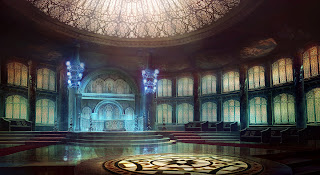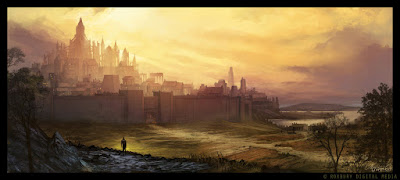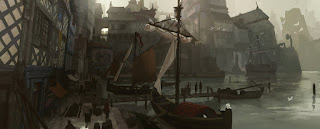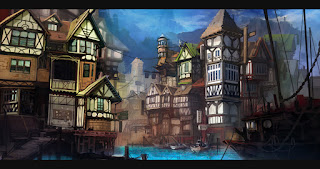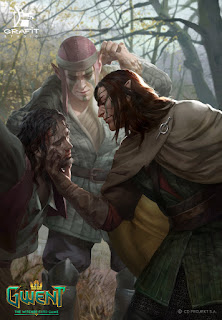This is part of a series on the lore of my homebrew world, Ahneria. As I outlined here, much of this information will be pulled from existing D&D lore and tropes. At the end, I'll be including a section on how to use this sort of thing in your own games.
I was going to post an article about Garton today, but recently I've been looking into the city of Auraglow. And tonight, I'll be running a game in said city, so I wanted to give my players some more information on it.
This list is inspired by the lists I used to describe Garton, but comes from the wonderfully-named Dungeons and Donuts tumblr. These questions are specifically for a city setting.
Let's get to it!
1. What religion is most prevalent in the city? Who benefits from this/who suffers?
The Boccob School of Theurgy acts as both an academy and a temple. The city was long ago founded on a holy site of Boccob, and worship of the God of Magic has continued to this day. For the most part, people are free to practice the religion of their choice within the city, but worshippers of less-magic oriented Gods (such as Heironeous, Kord, or St. Cuthbert) will be stuck with the poorly-maintained shrines at the Battlemage Institute. For the consecration and burial of the dead, most people look to the Temple of Wee Jas.
2. Who in the city will reliably buy art pieces and recovered relics from the PC’s? What’s their deal?
Relics of a magical nature can be sold to the various academies around the city. The Royal Academy offers the best prices, but only buys the rarest items. As for mundane artwork and gems, you'll have to find a buyer among the upper class, which includes the nobility and well-to-do collectors.
3. What is illegal in the city? What’s punishable with jail time, and what’s punishable by death?
Aside from the standard punishments for thievery, murder, and the like, the most illegal thing is the Antimagic Field spell. Because many of the buildings in Auraglow are partially or fully supported by magic, an Antimagic Field can be used to highly destructive effect. Because of this, it's one of the few crimes that is punishable by death.
4. If you get caught doing crimes, how are you tried? What’s the court system like?
The justice system is one of the few areas of the government that isn't controlled by any one academy. The courts, the city guard, and the prisons are all independent from the academies. They feature trial by judge, not jury, since the academies are incredibly popular and divisive and would certainly bribe jurors against each other. However, there are a couple academies that have the clout and resources to bribe the judges themselves... though they won't admit to it.
5. What’s the opinion of magic in the city, and is there a place to study it?
Magic is great! Here's the largest academies in Auraglow:
- The Royal Academy of Wizards (Headmistress: Ophelia Landon)
- The Boccob School of Theurgy (High Priest: Mother Constance)
- Academy Realis (Headmaster: Enoch Ebenezer Elmstone, or Triple-E)
- Claringbold Sorcerer's School (Headmistress: Millicent Minerva Mannerings, or Triple-M)
- The Temple of Wee Jas (High Priest: Father Demetrius)
- The Battlemage Institute (Head Instructor: Edgar Gold)
- The Hilde School of Bardic Magic and Home for Wayward Orphans (Headmistress: Leigh)
6. Who is the richest person in the city? Who are their enemies?
Ophelia Landon, Headmistress of the Royal Academy of Wizards, controls the most wealth in the city. Being in such a position naturally draws the ire of the headmasters of the other academies, as well as the disdain of the nobility who believe she has more of a hand in the government than she should. However, she often grants a position on the Academy's School Board to those who speak out too loudly, and they are usually appeased. The School Board doesn't have much influence on her behavior, but does decide a lot about the Royal Academy.
7. What kind of government does the city have? Whose interests do they represent?
The government, like most in Garlancia, is a parliamentary system consisting of a publicly-approved council. However, the council mostly concerns itself with judicial matters and leaves the actual governance to the academies. This makes Ophelia Landon the de facto queen of the city, a situation that is highly controversial. However, she is generally just in her rule, so it continues unabated.
8. What’s under the city? Sewers, dungeons, tunnels, aqueducts? What lives in them?
Long before humans populated the Garlancian valley, this area was overrun by Yuan-Ti who had escaped the civil war among the reptile empires of the north. Though they preferred their demon snake lords to Boccob, they could not deny such a powerful holy site of the God of Magic. They built a small city here, which was razed and rebuilt by early human conquerors. The deeper parts of the city might still have access to the basements and tombs which were once beneath the Yuan-Ti's homes. Though the Yuan-Ti in this area are long dead, the deep tunnels might still contain monsters that guarded their land, undead snake people, or creatures that have crawled up from the Underdark to live in those areas. Oh, and demons. Probably demons, too.
9. What neighbourhoods of the city might the PC’s be barred entry to, based on race/class/status/etc?
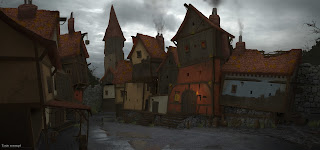
- Caldweld Vale, where the rich and noble live and do business
- Upper South Molrak, where many temples and religious services are kept
- East Sobric, general housing for artisans, merchants, and the middle class
- South Screed, the slums
- Fort Chogan, the guard's barracks and Battlemage Institute
It's a common joke to tell new visitors to a city that the place they are looking for is in "North Screed", "Lower South Molrak", "West Sobric", etc. These locations might have existed in the past, but they are no longer anywhere to be found.
Finally, there are farms to the south of the city, and a small cemetery just outside the northeastern wall.
10. What’s the terrain like in the city? Is it flat, hilly, are the streets wide or narrow? Does it differ from neighbourhood to neighbourhood?
The city is somewhat hilly, though the long slopes don't impede carriage traffic at all. The farmland to the south is flatter, but about a mile outside the city it begins to get quite hilly and densely forested.
Most neighborhoods have wide streets, often lined with vendors selling their wares. It's a common sight to see magical plants growing from pots and planters in windows. However, in South Screed, the streets are much narrower, and houses are packed next to and on top of each other. Everything is coated in a fine layer of dirt, and the city looks grey-er for some reason. There aren't nearly as many plants to go around.
11. What’s the climate and weather like? Is it temperate, cold, hot, rainy? This should influence both clothing and food available.

12. What’s the architecture of ordinary buildings like? Multi-story, towers, brick, wood, organic materials, basements, attics? Are they easily climbed or broken into?
In a word, buildings here are precarious. They are often in odd shapes or stacked on top of each other in unusual ways, being held up by magic of some kind. Its a carpenter's nightmare. There are plenty of towers and attics but not too many basements.
The more expensive the home, the more normal it appears. This makes breaking into buildings paradoxically easier if the place is fancier. Very nice homes will have more guards and Alarm spells to compensate.
13. What’s currently in fashion among the rich and middle class? Are there sumptuary laws?
As is often the case in Auraglow, buying magic items is in fashion, as is paying for the development of new kinds of magic. This is a slower process, and delving into certain kinds of magic without the appropriate credentials could get you into trouble. Also, certain magic items (mostly weapons) require permits to buy and sell, and the cost of a permit can be quite exorbitant.
14. Is dueling permitted/encouraged? What laws exist around it? How likely are PC’s to be challenged to a duel on the street?
Dueling is common, but only with magic. Turning a weapon on someone is grounds for an arrest, as is attacking someone who can't use magic. Additionally, in a duel, only spells with a range of touch/self, or spells with attack rolls are legal. Area-of-Effect spells are considered a threat to the public and face punishment. Because of this, Sorcerers and Druids tend to be at a bit of a disadvantage in duels. The PCs aren't likely to be challenged to a duel, unless they are clearly dressed as a magic-user and are insulting/hurting people.
15. What’s one unique building/landmark/feature the city is most famous for? There should be more than one, but you should have at least one.
Until a few months ago, there was a massive ball of light floating in the sky above the city, remnant of the final battle between Lefeld McConnell and Sandhu-Kam. However, when the demon Kam was finally destroyed, the Aura flickered to nothing. Since then, the city has been more famous for its magic schools than anything else.
16. What are some typical random encounters the PC’s might come across in the streets during the day? At night? You should be able to come up with about 6-10 for each.
Day
- A wizard's owl familiar, carrying something that looks fragile and expensive. It flies down the street, just out of reach of the crowds.
- A group of students in school robes. They heckle those who are wearing the colors of other schools.
- An acolyte of Wee Jas is berating someone for not properly disposing of a corpse. The person being berated is quite upset by the whole conversation.
- A wizard walks down the street wearing fine robes and accompanied by a Shield Guardian. The crowds eye the Guardian with great jealousy.
- A small patrol of Elite Guards from the Battlemage Institute walk the streets, looking for lawbreakers.
- A doomsayer stands on the street corner, pronouncing the end of the city is nigh, since the Aura above has abandoned them. People seem to be taken in by these words.
- A group of thugs eyes a vendor's stall. If not stopped, they beat up the vendor and demand money to be paid. They either work for a noble (25%) or a crime lord (75%).
- A potted plant falls off a window ledge and right into a PC's head. 10% chance it was magical, and might cause poison, disease, or attack the party.
- An urchin runs up to the party and offers to lead them around the city. 25% chance that another urchin tries to pick their pockets while this exchange happens.
- A carriage rolls down the street. Inside, a headmaster from one of the academies is hotly discussing something with a local judge. Guards surround the whole affair.
- A dog chases a wizard's Quasit familiar into an alleyway. Moments later, the dog runs out of the alley, terrified.
- A shambling humanoid figure lurches down the road. It doesn't stop, but you can't get too close without smelling death...
- A group of robed figures file out of a building, nod to each other, then disperse.
- A human with patchy, grey hair waddles down the street. If it's a full moon, they are in full were-rat form, hunting for food in the shadows.
- A patrol of City Guards stop everyone they meet, asking them what they are doing out so late.
- A pair of lithe humans lurk in an alleyway. Their amber eyes glare out at you as you pass, but they mind their own business. Unless provoked, of course.
- A stone figure shifts on a rooftop. Its eyes follow you - probably a gargoyle enchanted to guard this dwelling.
- The sound of a distant bell clangs into the night. Likely, someone tried to break into a house and tripped an Alarm spell.
- The street goes deathly quiet. Footprints appear on the road, footprints with no owner. They walk thirty paces, then stop. Nothing is there.
- A hobbled old wizard roams the streets. When you draw near, they beckon you with a gnarled finger, and offer you an item that you're sure is illegal.
17. Who can the PC’s turn to if they break the law or need to escape from town guards? What payment/favours will this person ask for in return?
There is one person... though you probably won't speak to him. He uses a lot of intermediaries, for his own protection, of course. His name is Elliot Weston, and his title is Lord of the Slums. He has influence everywhere in South Screed, and will gladly take in those who are on the run from the law. However, his price is high. He is a Warlock whose goal is to make more Warlocks, and he has numerous extraplanar connections who are chomping at the bit for servants. He will more than likely demand for the most Charismatic party member to take a Warlock Pact (meaning their next level is a warlock level).
18. Can you openly wear weapons in the city? If not, who is exempt from this rule?
You certainly can, but turning them on others is illegal. Also, those who wear weapons are generally thought to be non-magic users, so wearing one gives you plausible deniability to avoid duels. However, this rule doesn't apply in Fort Chogan, where wearing a weapon can easily get you challenged to show your credentials with the Battlemage Institute or the City Guard. Lacking such papers, you might be charged with threatening the safety of the city and subsequently arrested.
19. What are some common animals you might see in the streets? Where are animals or beasts not allowed to enter?
City animals such as stray dogs, cats, and rats are common, though they are less often found in Caldweld Vale and more often encountered in South Screed. Also, Wizards often send their familiars on errands around the city, so running into a Fiendish or Fey version of an animal is fairly normal as well. Most pack animals are allowed in the city, but livestock are generally kept outside the city walls.
20. What can’t be bought in the city, and would need to be smuggled into the city illegally? Who in the city could reliably do this?
Certain trade goods, such as Mermaid skins and Dwarf teeth, are outlawed in major cities due to the obvious conflict of interest with Garlancia's allies. That doesn't stop unscrupulous wizards from obtaining them, though. Elliot Weston's smuggling rings can reliably get anything into or out of the city, though as usual his prices can be quite steep.
Using This Material in Your Setting
- Just answer the questions, okay? They're very good. It gets you thinking about the depth of the city!




